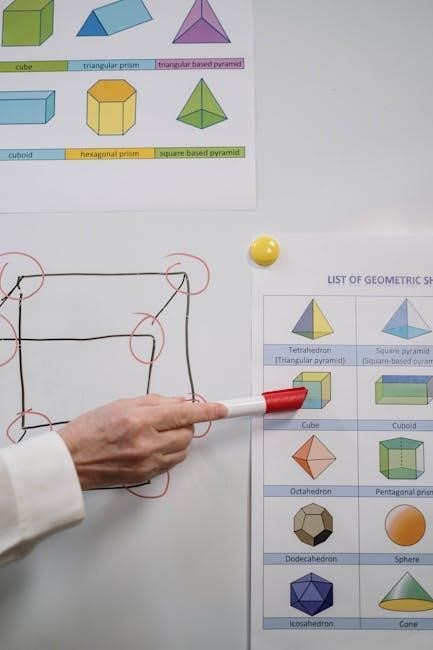An Instructional Dean plays a pivotal role in overseeing academic programs‚ fostering faculty development‚ and ensuring curriculum alignment with institutional goals‚ ultimately enhancing student learning outcomes and institutional success.
1.1 Overview of the Position
The Instructional Dean oversees academic programs‚ ensuring alignment with institutional goals and fostering a supportive learning environment. This role involves strategic planning‚ faculty development‚ and curriculum design to enhance student success. The dean collaborates with faculty and administrators to address educational challenges and promote innovation. Balancing academic and administrative duties‚ the position requires strong leadership‚ communication‚ and problem-solving skills to drive institutional growth and maintain academic excellence. It is a pivotal role in shaping the educational landscape and achieving organizational objectives effectively.
1.2 Importance in Educational Institutions
The Instructional Dean is crucial in driving academic excellence‚ fostering innovation‚ and ensuring student success. By overseeing curriculum development and faculty support‚ they align educational programs with institutional goals. Their leadership enhances collaboration across departments‚ promoting a cohesive academic environment. Effective deans influence institutional culture‚ contribute to student learning outcomes‚ and shape faculty excellence‚ making their role indispensable in achieving educational objectives and maintaining high standards of teaching and learning within the institution.

Key Responsibilities of an Instructional Dean
An Instructional Dean oversees academic programs‚ supports faculty development‚ and manages curriculum design. They ensure alignment with institutional goals‚ fostering academic excellence and innovation in education.
2.1 Academic Program Development
An Instructional Dean drives the development and enhancement of academic programs‚ ensuring they align with institutional goals and meet evolving educational needs. They collaborate with faculty and stakeholders to design innovative curricula and assess program effectiveness‚ fostering academic excellence and relevance.
2.2 Faculty Support and Development
The Instructional Dean is instrumental in fostering faculty growth by providing professional development opportunities‚ mentoring‚ and resources to enhance teaching and research skills. They ensure faculty members are well-equipped to deliver high-quality education‚ address challenges‚ and stay updated with educational trends. This support fosters a collaborative environment‚ promoting faculty excellence and innovation‚ which directly benefits student learning and institutional success.
2.3 Curriculum Design and Implementation
The Instructional Dean leads the development and execution of curriculum‚ ensuring it aligns with institutional objectives and meets student needs. They collaborate with faculty to design innovative programs‚ assess academic requirements‚ and integrate emerging educational trends. The Dean also oversees the implementation process‚ ensuring a smooth transition and continuous improvement. This role is crucial for maintaining academic rigor‚ relevance‚ and student engagement‚ ultimately enhancing the quality of education and institutional reputation.

Qualifications and Requirements
An Instructional Dean typically requires an advanced degree‚ proven leadership experience‚ and strong communication skills to effectively manage academic programs and foster collaborative environments.
3.1 Educational Background
An Instructional Dean typically holds an advanced degree‚ such as a master’s or Ph.D.‚ in a relevant field. Their educational background often includes expertise in curriculum design‚ academic leadership‚ and pedagogical strategies. Many deans begin their careers as faculty members‚ gaining hands-on experience in teaching and research before transitioning into administrative roles. This academic foundation equips them to oversee program development‚ assess educational outcomes‚ and guide faculty in aligning teaching practices with institutional goals.
3.2 Leadership and Administrative Experience
An Instructional Dean typically possesses significant leadership and administrative experience‚ often gained through roles such as department chairs or program directors. They demonstrate proven ability in managing academic departments‚ fostering collaboration‚ and aligning initiatives with institutional objectives. Strong organizational and strategic planning skills are essential‚ as they oversee budgets‚ resource allocation‚ and policy implementation. Their experience in navigating complex academic environments ensures effective decision-making and the ability to drive innovation in educational settings.
3.4 Communication and Interpersonal Skills
Effective communication and interpersonal skills are critical for an Instructional Dean‚ enabling them to collaborate with faculty‚ students‚ and administrators. Strong verbal and written communication fosters clarity in decision-making and policy implementation. Active listening and empathy are essential for addressing diverse perspectives and resolving conflicts. Building trust through transparent interactions ensures a positive institutional culture. These skills also facilitate mentoring and professional development‚ fostering a collaborative environment that supports academic excellence and student success.

Role in Faculty Development
An Instructional Dean guides faculty growth through mentoring‚ fostering professional development‚ and encouraging innovative teaching and research practices to enhance academic excellence and institutional effectiveness.
4.1 Mentoring and Professional Growth
An Instructional Dean fosters faculty growth by providing mentorship‚ encouraging collaboration‚ and promoting professional development opportunities. They support educators in enhancing their teaching and research skills‚ ensuring a supportive environment for faculty to thrive academically and professionally. By fostering a culture of continuous improvement‚ the dean helps faculty achieve their career goals‚ contributing to the overall excellence of the institution. This role is crucial in nurturing faculty potential and maintaining high academic standards.
4.2 Promoting Research and Innovation
An Instructional Dean encourages research initiatives and innovative teaching methods to enhance academic excellence. They support faculty in pursuing scholarly activities‚ fostering a culture of inquiry and creativity. By advocating for resources and collaborations‚ the dean drives advancements in education and technology‚ ensuring the institution remains at the forefront of pedagogical and technological evolution. This commitment to innovation not only enriches faculty expertise but also elevates student learning experiences‚ preparing them for future challenges.
4.3 Addressing Faculty Concerns
The Instructional Dean fosters open communication to address faculty concerns‚ ensuring a supportive academic environment. By actively listening and providing tailored solutions‚ the dean helps resolve issues promptly. This approach promotes collaboration‚ reduces conflicts‚ and ensures faculty well-being‚ ultimately enhancing student success. The dean’s role in addressing concerns is crucial for institutional harmony and effectiveness.

Curriculum Development and Oversight
The Instructional Dean oversees curriculum development‚ ensuring alignment with institutional goals‚ academic rigor‚ and relevance‚ while incorporating emerging educational trends to enhance student learning experiences effectively.
5.1 Aligning Curriculum with Institutional Goals
The Instructional Dean ensures that academic programs align with the institution’s strategic objectives‚ fostering a cohesive educational framework. By regularly assessing curriculum relevance and incorporating feedback‚ the dean guarantees that courses prepare students for evolving demands while maintaining academic excellence. This alignment not only enhances the institution’s mission but also strengthens its reputation and appeal to prospective students and stakeholders.
5.2 Ensuring Academic Rigor and Relevance
The Instructional Dean ensures that academic programs maintain high standards of rigor and relevance‚ preparing students for real-world challenges. By regularly reviewing and updating curricula‚ the dean ensures alignment with current educational demands and industry needs. This involves collaborating with faculty to develop engaging‚ evidence-based learning experiences that foster critical thinking and skill development‚ ultimately enhancing student success and institutional reputation through a commitment to academic excellence and adaptability.
5.3 Incorporating Emerging Trends in Education
The Instructional Dean actively identifies and integrates emerging educational trends‚ such as online learning platforms and innovative teaching technologies‚ to enhance academic programs. By staying attuned to industry advancements and societal shifts‚ the dean ensures that curricula remain forward-thinking and responsive to student needs. This involves collaborating with faculty to adopt new methodologies and tools‚ fostering a dynamic learning environment that prepares students for future challenges while maintaining academic excellence and relevance in a rapidly evolving world.

Student Success Initiatives
Instructional Deans lead efforts to enhance student outcomes by improving retention rates‚ fostering inclusive learning communities‚ and supporting undergraduate research‚ ensuring students thrive academically and personally.
6.1 Improving Retention Rates
Instructional Deans play a crucial role in enhancing student retention by implementing targeted initiatives such as early intervention programs‚ academic advising‚ and support services. They collaborate with faculty to identify at-risk students and provide resources to help them succeed. By fostering a supportive learning environment and promoting engagement‚ Deans contribute to higher retention rates‚ ensuring students persist and achieve their academic goals effectively.
6.2 Enhancing Learning Communities
Instructional Deans foster vibrant learning communities by promoting collaboration among students‚ faculty‚ and staff. They encourage the creation of inclusive spaces where diverse perspectives thrive‚ enhancing overall academic experiences. By supporting initiatives like study groups‚ peer mentoring‚ and interdisciplinary projects‚ Deans cultivate a sense of belonging and intellectual growth‚ enriching the educational environment and fostering student success.
6.3 Supporting Undergraduate Research
Instructional Deans play a crucial role in fostering undergraduate research by providing resources‚ mentorship‚ and opportunities for students to engage in scholarly activities. They collaborate with faculty to design research programs‚ secure funding‚ and create platforms for students to present their work. By prioritizing research initiatives‚ Deans help students develop critical thinking‚ innovation‚ and problem-solving skills‚ preparing them for academic and professional success while enhancing the institution’s reputation for academic excellence and innovation.

Collaboration with Other Departments
Instructional Deans collaborate with administrative offices‚ build partnerships with external organizations‚ and foster cross-campus teamwork to align resources‚ enhance programs‚ and achieve institutional goals effectively.
7.1 Working with Administrative Offices
Instructional Deans work closely with administrative offices to ensure alignment of academic goals with institutional policies. They collaborate on resource allocation‚ student support services‚ and compliance with regulations‚ fostering a cohesive environment that supports both faculty and students. This partnership ensures efficient operations and enhances the overall educational experience‚ contributing to the institution’s strategic objectives and fostering a culture of collaboration and shared responsibility.
7.2 Building Partnerships with External Organizations
Instructional Deans foster partnerships with external organizations to enhance educational opportunities and resources. By collaborating with businesses‚ community groups‚ and other entities‚ they secure funding‚ internships‚ and innovative programs. These partnerships often lead to research opportunities and professional development for faculty‚ aligning academic goals with real-world needs. Building these relationships strengthens the institution’s community ties and expands student learning experiences‚ ensuring relevance and adaptability in a changing educational landscape.
7.3 Fostering Cross-Campus Collaboration
Instructional Deans play a crucial role in fostering cross-campus collaboration by bridging departments‚ faculties‚ and student bodies. They encourage joint initiatives‚ such as interdisciplinary research projects and shared resource programs‚ to create a cohesive academic environment. By promoting open communication and teamwork‚ they help align diverse campus groups toward common goals‚ enhancing institutional efficiency and innovation. This collaborative approach not only strengthens the academic community but also enriches the learning experience for students and faculty alike‚ fostering a culture of shared success and mutual support.

Challenges Faced by an Instructional Dean
An Instructional Dean faces challenges such as balancing academic and administrative duties‚ managing limited resources‚ and adapting to rapid changes in the educational landscape effectively.
8.1 Balancing Academic and Administrative Duties
An Instructional Dean must skillfully balance academic responsibilities‚ such as curriculum development and faculty support‚ with administrative tasks like budget management and policy implementation. This dual role requires strong organizational skills to ensure both areas receive adequate attention. The dean must prioritize tasks effectively‚ often juggling multiple demands simultaneously. Additionally‚ maintaining open communication with faculty and staff helps streamline processes. Successfully balancing these duties ensures the smooth operation of academic programs and supports the institution’s overall mission and goals.
8.2 Managing Limited Resources
Managing limited resources is a significant challenge for an Instructional Dean‚ requiring strategic planning and prioritization. Effective allocation of budget‚ personnel‚ and technology ensures optimal use of available funds. Deans must identify institutional priorities‚ balancing academic needs with administrative requirements. Collaboration with other departments and seeking external funding opportunities can help mitigate resource constraints. Transparent communication with stakeholders is essential to align expectations and ensure resources are utilized efficiently to support academic excellence and institutional goals.
8.3 Adapting to Changing Educational Landscape
An Instructional Dean must navigate the evolving educational landscape‚ addressing shifts in teaching methods‚ technological advancements‚ and changing student needs. Adapting to these changes requires continuous professional development and fostering innovation within the institution. The dean plays a crucial role in integrating new technologies and pedagogical approaches‚ ensuring the curriculum remains relevant and aligns with emerging trends. This involves collaboration with faculty‚ administration‚ and external partners to create a responsive and forward-thinking academic environment that supports student success and institutional growth.

The Impact of an Instructional Dean
An Instructional Dean significantly influences student success‚ faculty excellence‚ and institutional culture‚ driving initiatives that enhance learning outcomes‚ retention‚ and research opportunities‚ fostering a vibrant academic community.
9.1 Influence on Institutional Culture
An Instructional Dean shapes the institutional culture by promoting collaboration‚ innovation‚ and shared goals. They foster inclusivity and diversity‚ encouraging a supportive environment that values both students and faculty. By aligning academic initiatives with the institution’s mission‚ the Dean cultivates a culture of excellence and continuous improvement. Their leadership ensures that the institution remains adaptive to educational trends while maintaining a strong commitment to its core values. This influence fosters a positive and productive academic community.
9.2 Contribution to Student Learning Outcomes
An Instructional Dean significantly impacts student learning by fostering innovative teaching strategies‚ supporting faculty development‚ and aligning curriculum with institutional goals. They ensure academic programs are rigorous‚ relevant‚ and tailored to meet student needs‚ promoting higher retention rates and academic success. By addressing barriers to learning and enhancing support services‚ the Dean contributes to improved student outcomes‚ preparing learners for future challenges and fostering a culture of academic excellence and continuous improvement.
9.3 Role in Shaping Faculty Excellence
An Instructional Dean plays a crucial role in fostering faculty excellence by promoting professional growth‚ encouraging innovation‚ and providing resources for continuous development. They support faculty in enhancing teaching methods‚ engaging in research‚ and adapting to educational trends. By addressing faculty concerns and fostering a collaborative environment‚ the Dean ensures that educators are equipped to deliver high-quality instruction and contribute to the institution’s academic success‚ ultimately benefiting both students and the institution as a whole.
Future Trends in the Role of an Instructional Dean
The role of an Instructional Dean is evolving to emphasize online learning‚ technology integration‚ and diversity initiatives‚ ensuring education remains relevant and inclusive for future generations.
10.1 Emphasis on Online and Hybrid Learning
The increasing demand for flexible education has shifted focus to online and hybrid learning models. Instructional Deans are now central in implementing these programs‚ ensuring accessibility and quality. By leveraging technology‚ they facilitate engaging virtual classrooms and personalized learning experiences. Deans must also support faculty in adapting to digital platforms and multimedia tools. This trend emphasizes balancing innovation with traditional teaching methods‚ ensuring that online education enhances‚ rather than replaces‚ the richness of in-person learning while meeting diverse student needs effectively.
10.2 Integration of Technology in Education
Instructional Deans are instrumental in integrating technology to enhance teaching and learning. They oversee the adoption of digital tools‚ such as Learning Management Systems (LMS) and data analytics‚ to improve instructional strategies. By supporting faculty in using technology effectively‚ Deans ensure engaging‚ interactive‚ and personalized learning experiences. Additionally‚ they address challenges like equitable access to technology‚ fostering an inclusive digital environment. This integration not only modernizes education but also prepares students and faculty for future challenges‚ making technology a cornerstone of institutional advancement and innovation.
10.3 Focus on Diversity‚ Equity‚ and Inclusion
Instructional Deans are increasingly focused on fostering diversity‚ equity‚ and inclusion within academic institutions. They promote inclusive environments by addressing disparities and ensuring equitable access to resources. Deans advocate for diverse hiring practices‚ culturally responsive pedagogies‚ and policies that support underrepresented groups. By championing these initiatives‚ they help create learning communities that value diversity and empower all students and faculty to thrive. This focus ensures that institutional goals align with principles of equity and inclusion‚ driving meaningful change across campuses.

Best Practices for Effective Leadership
Effective leadership by an Instructional Dean involves strategic planning‚ clear communication‚ and fostering a collaborative environment to drive academic excellence and institutional growth.
11.1 Strategic Planning and Visionary Leadership
Strategic planning and visionary leadership are essential for an Instructional Dean to align academic goals with institutional missions. By anticipating future trends and fostering innovation‚ deans can guide faculties in adapting to changing educational landscapes‚ ensuring relevance and excellence in programs. Effective deans envision long-term objectives‚ creating actionable plans that promote student success‚ faculty growth‚ and institutional advancement‚ thereby shaping a dynamic and forward-thinking academic environment.
11.2 Effective Communication Strategies
Effective communication is crucial for an Instructional Dean to foster collaboration and clarity across campus. By actively listening to faculty‚ students‚ and staff‚ deans can address concerns and align goals. Clear‚ transparent messaging ensures everyone understands priorities and expectations. Utilizing multiple communication channels‚ from meetings to digital platforms‚ enhances accessibility and engagement. Strong interpersonal skills also help deans navigate conflicts and build trust‚ creating a cohesive and supportive academic environment that promotes shared success and innovation.
11.3 Data-Driven Decision Making
An Instructional Dean leverages data to inform decision-making‚ ensuring alignment with institutional goals. By analyzing metrics like student performance‚ retention rates‚ and program outcomes‚ deans can identify trends and areas for improvement. Data-driven approaches enable informed resource allocation‚ curriculum adjustments‚ and strategic initiatives. Regular assessment of outcomes ensures that decisions enhance academic quality‚ student success‚ and institutional effectiveness‚ fostering a culture of continuous improvement and accountability.
The Instructional Dean plays a vital role in shaping educational excellence‚ driving curriculum innovation‚ and fostering faculty and student success‚ ultimately contributing to an institution’s growth and impact.
12.1 Summary of Key Points
The Instructional Dean oversees academic programs‚ supports faculty growth‚ and aligns curricula with institutional goals. They drive student success initiatives‚ manage administrative duties‚ and adapt to educational trends. By fostering innovation‚ collaboration‚ and equity‚ the Dean significantly impacts institutional culture and learning outcomes. Their leadership ensures academic rigor‚ addresses faculty concerns‚ and promotes research. Ultimately‚ the Dean’s role is pivotal in shaping an institution’s academic excellence and future direction‚ making them a cornerstone of educational leadership and innovation.
12.2 Final Thoughts on the Role
The Instructional Dean serves as a pivotal leader‚ bridging the gap between academic vision and execution. Their influence on institutional culture‚ student outcomes‚ and faculty excellence is profound. By fostering innovation‚ equity‚ and collaboration‚ the Dean ensures the institution remains competitive and aligned with evolving educational needs. Their role is not just administrative but transformative‚ leaving a lasting impact on the academic community and shaping the future of education.


